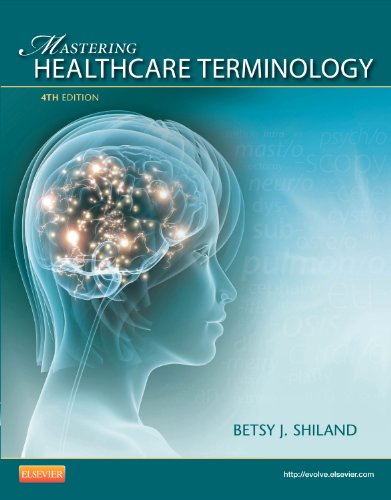Test Bank For Shiland Mastering Healthcare Terminology 4th Edition
Digital item No Waiting Time Instant DownloadISBN-10: 323080324 ISBN-13: 9780323080323Publisher : Mosby; 4th editionAuthors: Betsy J. Shiland MS RHIA CCS CHDA CPC CPB CPPM
In Stock
Original price was: $55.00.$20.00Current price is: $20.00.
Test Bank For Shiland Mastering Healthcare Terminology 4th Edition
Table of ContentsIntroductionBody Structure and Directional TerminologyMusculoskeletal SystemIntegumentary SystemGastrointestinal SystemUrinary SystemMale Reproductive SystemFemal Reproductive System and PregnancyBlood, Lymphatic, and Immune SystemsCardiovascular SystemRespiratory SystemNervous SystemMental and Behavioral HealthSpecial Senses: Eye and EarEndocrine SystemOncologyAPPENDICESWord Parts and DefinitionsDefinitions and Word PartsAbbreviationsEnglish-to-Spanish Translations
Test Bank for Mastering Healthcare Terminology, 4th Edition by Betsy J. Shiland
The “Test Bank for Mastering Healthcare Terminology, 4th Edition” by Betsy J. Shiland is an essential educational resource designed to support educators and students in mastering the fundamental principles of healthcare terminology. This comprehensive test bank complements the textbook by providing a wide range of questions that assess and reinforce understanding of key healthcare terms and concepts, making it an invaluable tool for both teaching and learning. Below is a detailed overview of the components and benefits of this test bank:
Overview of Test Bank Content
- Chapter-by-Chapter Organization
- The test bank is meticulously organized to align with each chapter of the textbook, ensuring comprehensive coverage of all critical topics. This organization facilitates easy integration into the curriculum and enables targeted assessments.
- Types of Questions
- Multiple-Choice Questions (MCQs): Assess a broad spectrum of knowledge, from basic recall to complex application and critical thinking. Each question includes well-crafted distractors to challenge students’ understanding.
- True/False Questions: Evaluate students’ ability to differentiate between correct and incorrect statements, reinforcing factual knowledge and addressing common misconceptions.
- Fill-in-the-Blank Questions: Focus on recalling specific details such as key terms, definitions, and important concepts, testing students’ memory and understanding.
- Short Answer Questions: Require detailed yet concise responses, evaluating students’ ability to explain healthcare terminology clearly and accurately.
- Essay Questions: Assess students’ ability to synthesize and articulate complex ideas, demonstrating a deep understanding of healthcare terminology principles and their applications.
- Case Studies and Scenarios: Real-world scenarios and case studies help students apply theoretical knowledge to practical situations, enhancing their critical thinking and problem-solving skills.
- Difficulty Levels
- Questions are categorized by difficulty to provide a range of challenges and assess students’ proficiency at different levels, including:
- Basic: Testing foundational knowledge and comprehension.
- Intermediate: Requiring application of knowledge to practical healthcare scenarios.
- Advanced: Involving critical thinking, analysis, and synthesis of complex healthcare terminology.
- Questions are categorized by difficulty to provide a range of challenges and assess students’ proficiency at different levels, including:
- Core Focus Areas
- Introduction to Healthcare Terminology: Questions covering the basic principles and scope of healthcare terminology, including the importance of accurate terminology in healthcare settings.
- Body Structure and Function: Detailed coverage of terms related to the structure and function of the human body, including anatomical terms and physiological processes.
- Medical Specialties and Specialists: Assessing knowledge of terms related to various medical specialties, including cardiology, neurology, oncology, and more.
- Diseases and Conditions: Questions on terminology related to common diseases, conditions, and disorders, including their signs, symptoms, and diagnostic procedures.
- Medical Procedures and Tests: Focus on terms related to diagnostic tests, medical procedures, and surgical interventions.
- Pharmacology: Examining terminology related to medications, including drug classifications, mechanisms of action, and common prescriptions.
- Body Systems: Assessing understanding of terms related to different body systems, including the cardiovascular, respiratory, digestive, and nervous systems.
- Prefixes, Suffixes, and Root Words: Coverage of the building blocks of medical terminology, including common prefixes, suffixes, and root words used to construct medical terms.
- Abbreviations and Acronyms: Questions on commonly used medical abbreviations and acronyms, their meanings, and appropriate usage.
- Communication and Documentation: Evaluating knowledge of effective communication and accurate documentation practices using healthcare terminology.
- Alignment with Learning Objectives
- Each question in the test bank is aligned with the learning objectives outlined in the textbook, ensuring that assessments are relevant and targeted toward achieving the intended educational outcomes. This alignment helps in accurately measuring students’ progress and comprehension.
- Educational Support and Utility
- For educators, the test bank provides a comprehensive resource for creating quizzes, exams, and other assessments. It simplifies the process of test creation and ensures consistency and alignment with the curriculum.
- For students, the test bank serves as a valuable tool for self-assessment and study, helping them identify areas of strength and weakness and focus their efforts on areas needing improvement.
Benefits of Using the Test Bank
- Enhanced Learning and Retention
- The diverse range of question types and difficulty levels helps reinforce learning through varied and repeated exposure to key concepts, enhancing retention and understanding.
- Preparation for Real-World Applications
- By focusing on real-world scenarios and practical applications, the test bank prepares students for the practical aspects of healthcare, ensuring they are ready to apply their knowledge in clinical settings.
- Comprehensive Assessment
- The test bank allows for thorough and multi-faceted evaluation of students’ knowledge and skills, from basic understanding to advanced application, ensuring a well-rounded educational experience.
- Efficient Teaching Resource
- For educators, the test bank simplifies the process of creating assessments, providing a consistent and reliable tool for evaluating students’ progress and readiness for advanced studies in healthcare terminology.
Conclusion
The “Test Bank for Mastering Healthcare Terminology, 4th Edition” by Betsy J. Shiland is an essential resource for healthcare terminology education. It provides structured, comprehensive, and versatile tools for assessing and enhancing students’ knowledge and skills in healthcare terminology. By aligning closely with the textbook and emphasizing real-world application, the test bank supports the development of competent, confident professionals ready to excel in their understanding and application of healthcare terminology principles in various clinical and professional settings.


Reviews
There are no reviews yet.